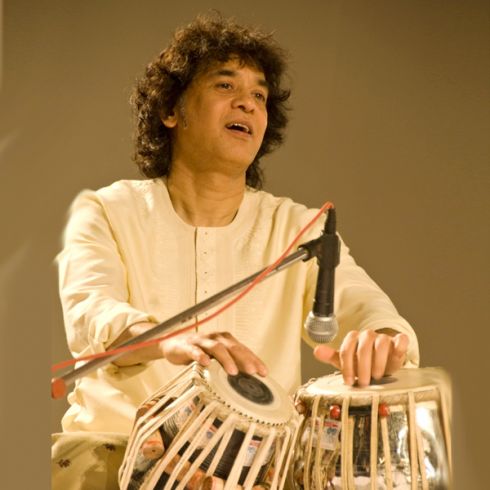
MUMBAI: At a recent conference, Tabla maestro Zakir Hussain spoke in support of the tabla community in large, on a public forum. The percussionist believes that tabla players must know to play all musical instruments and they should also be vocalists, in order to survive in the current music industry.
The panel discussion moderated by NCPA head of Indian music programming Dr. Suvarnalata Rao, was between tabla maestro Zakir Hussain and conductor Zane Dalal. It was held on 24 September, 2015 at The Experimental Theatre, NCPA, and was based on ‘Peshkar’, a new piece of music for the Symphony Orchestra of India.
It focused on a number of topics like the challenge of writing an orchestral piece while staying true to Indian classical roots, the evolution of the tabla, difference between Indian and Western music and more.
Speaking about putting the Orchestra piece together Hussain said, “In my opinion, the tabla is one of the most natural instruments to be brought to a place, where it can interact with musical instruments, which do not belong to Indian music. I kept that in mind when I was writing this piece of music. I knew that I had to adhere to a style of writing, where the pitch of the tabla would work harmoniously without disturbing the other musical instruments.” The musician revealed that it took him about three to four weeks to put the entire composition together.
Hussain also explained the concept of bringing together Indian and western music. “It is our personalities, experiences and knowledge coming together in the form of this collaboration. The entire process was joyful and fun,” he stated.
Since both, Dalal and Hussain, live in California, it was easy for the duo to meet and discuss what they wanted the piece to sound like. Sharing their thoughts on the music Hussain said, “We have been deciding whether to have more or less emphasis on melody,” to which Dalal playfully added, “That does not mean that the piece will not have enough melody.”
The two also spoke about the evolution of tabla, with Hussain explaining that the tabla, today, is open to world music, making it a world instrument. He went down memory lane, comparing the music scene today and that from a few decades ago. Hussain explained how back in the 60s, musicians had to work hard to learn the art, unlike in today’s digital age where everything is available at the click of a button. In spite of that, they were not respected as they did not know about anything but music. Today, however, it is a completely different scene. Today’s musicians, regardless of their music knowledge, are the talk of the town.
Discussing ‘Peshkar’, which is a mix of both, west and east, the difference in Western music and Indian classical music was discussed. On this topic Dalal stated, “In the west we have everything in writing. We can read music because everything is noted. But we do not even have the liberty to change it.”
Hussain agreed saying, “We have a loophole of improvising and no documentation. Thus, we cannot in all honesty say that it is what was written out. What is available in recordings is what we have. So it is nowhere beyond 120 years. Western music has been documented for 300 to 400 years.”
The discussion ended with Hussain narrating an incident from his childhood when he used to play with his father- Ustad Qureshi Alla Rakha Khan. Hussain and his father just finished a performance when a man walked up to them and said to his father that young Hussain played exactly like him. “My father looked up to him and said ‘I hope he does not play like me because that would make him a copy of me.’ Thus, I feel that you should try and be yourself because everyone is already taken,” said Hussain.